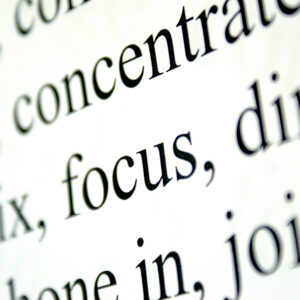There are so many crises that make the news, all of which are digested in bite-size morsels: political divisiveness, crime and policing, race relations, environmentalism, and the list goes on. What’s not on the list but should be? Our short and ever-dwindling attention span. I’d happily take a bite-sized version of our concentration disorder.
Consider this: The average human attention span is now shorter than a goldfish’s. A recent study found that the average human attention span has fallen from 12 seconds in 2000 to 8 seconds today. It is reported that goldfish have a 9-second attention span.
Even if we want to challenge the data—and it was in part the smart people at Microsoft who contributed to quantifying our attention span—most everyone would agree that whatever the number, it is getting smaller with each passing day. With each new smartphone and each new social media application, we descend into instantaneous reactions.
I know this as a writer. My Medium statistics tell me that readers do best with pieces that are 4-minutes or less which will be read for an average of 2 minutes and 46 seconds. When I see an article averaging over a 3-minute read-time, I break out the beer.
I note our shortened attention spans through other means, too. My book club, which is a committed group of readers, has asked for shorter picks. They freely admit it is hard to stick with long books. It is a rare person that can make their way through “Moby Dick” or “Anna Karenina.” This also helps explain why short stories are increasingly popular—especially if the stories are linked and form a community of characters, like Elizabeth Strout’s “Olive Kitteridge.”
Short attention spans might also explain the news cycle, which is increasingly short, where stories evaporate in no time. To achieve readability, the information has been dummified and, if presented on screen, delivered by entertainers. We have replaced Walter Cronkite with Michael Strahan, who I loved watching as an all-star defensive end but have, at best, mixed feelings about on the morning news.
Less we believe that our shortened attention spans are no big deal, think again. The problems of the day are complex, and critical thinking skills are needed to digest the nuances. If you want to offer something thoughtful on a challenging topic, you need to resist seeking that quick burst of information before moving on. Also, our devices should not have three windows open, enabling us to multi-task, while we process the question at hand.
Just consider the challenge of our broken health care system. Most people can agree on the goals of providing broader access and better continuity of care. But how? Rants or slogans won’t work, but if we proceed by looking at past attempts, what we learned, how we failed, and the unintended consequences of different approaches, how much better will our dialogue be? And that doesn’t even begin to address how much better our solutions might be.
Contributing to our short attention span might just very well be the media. Journalists that go long on a topic with the fullness it deserves risk losing their audience. This problem was diagnosed back in 2014 when, as reported by the Guardian, then executive and now managing editor of the Associated Press, Brian Carovillano, issued a memo as follows: “Most stories should be between 300 and 500 words while the more important ones should be between 500 and 700 words.”
Carovillano explained that readers lack the attention span for long stories, and editors were wasting too much of their time cutting copy. Sadly, he was right.
So let’s hear it for working to extend our attention span beyond that of a goldfish. What if we commit to not looking at a device while something is being explained to us? What if the media helps us build our concentration muscle by providing longer, engaging copy that peels back the onion? We can brand a “Critical Thinking Initiative” and explore how we might improve our game. Oh, the fun we can have!
It was Ralph Waldo Emerson who opined that, “Concentration is the secret of strength.”
Let us be strong.

